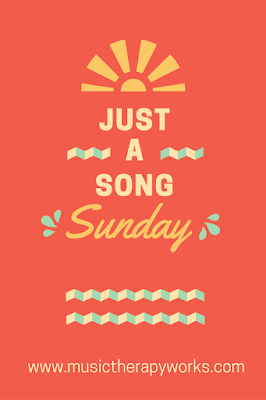Just A Song Sunday: Music as Part of Ritual
 I am getting ready to go to church for an early service and an Easter celebration. In my role as church music director, I am aware of the role of music in ritual. As a music therapist, that role is not as obvious, but present just the same.
I am getting ready to go to church for an early service and an Easter celebration. In my role as church music director, I am aware of the role of music in ritual. As a music therapist, that role is not as obvious, but present just the same.In the book, Music In Therapy by E. Thayer Gaston, Gaston started the book with a chapter on "Man and Music." During the chapter, Gaston discusses the various roles that music plays in the lives of human beings. Starting on page 19, Gaston starts to identify the different ways humans use music.
The two elements that really make me stop on this day - the ones that make me think deeply about being a musician, a human, and a music therapist - are Music and Religion Are Integrally Related and The Potency of Music Is Greatest in the Group (please note, all italics and capitalization are Gaston's, not my own). Before I go to the early Early Easter Service and the Easter Celebration (at a later time), I am going to think through these two thoughts.
Music and Religion Are Integrally Related
As a long-time church musician (started formally at age 7), I very strongly feel this idea as a foundation of my own faith journey and the journeys of others.This post, however, is not for the purposes of sharing my faith journey, so let me just say that remembering that music is part of the religious journey of many is important when you are tasked with providing comfort or connection with a person in distress. As a therapist, I know that finding out about a person's religious affiliation (whether established, non-existent, or developing) is important. I would never want to sing a song from my Protestant background for someone who practices Judaism or identifies as an atheist. It is important to understand that music becomes very strongly identified with rituals and ceremonies.
A non-religious example of the link between music and ritual is that of national anthems. When the strains of the National Anthem begins, large groups of people understand what is expected of them as a part of a larger society. In the USA, we are expected to stand, turn towards our flag, and place our right hands over our hearts. We have the option of not doing so, but it is expected. People notice if you don't follow the ritual. The only communication is the start of the music.
The Potency of Music Is Greatest in the Group
I think I disagree with Gaston a bit on this particular topic, but I can see where he is coming from. Gaston believed that "the chief aim of therapy is to enable the individual to function at his best in society" (p.27). He claimed that music provided opportunities for order and interaction within the experience and unified the group in common purpose. I believe that is true for some at times, but not always.
I do not believe that group treatment is the best way of assisting every client towards his or her goals, but there is something about being part of a large group of people who are making music together that cannot be replicated in any other situation. For me, as a human, I find that making music for myself is often more refreshing and meaningful than making music for others or with others. As a therapist, I find that sharing music experiences with others is very therapeutic, but there isn't a need for that sharing to be done with large groups. I'm not sure if Gaston thought that the client/therapist dyad was a "group" or not. Technically, it is more than an individual, but not what I think of as a group.
Music therapy is something that has to be shared. It has to be experienced by the therapist and the client in order for therapy to occur (in my mind, at least). I may get a benefit from making music on my own in my own home, but that is not music therapy. Sure, that's a bit of a technicality, but it is an important distinction in my mind. So, music is therapy when it can be shared with more than one person, and those people can use the music for a purpose and towards a mutual agreed upon goal.
As I go out into this morning of rite, ritual, and celebration, I will be participating in culturally significant experiences with other like-minded people. We will sing familiar songs. We will listen to music from many different centuries. We will follow liturgical call and response patterns. Additionally, we will share these experiences with others who choose to be with us. The music will play an important role in our celebration.
Gaston, E. T. (1968). Man and music. In E. T. Gaston (Ed.) Music in therapy (7-29). New York: MacMillan.

Comments
Post a Comment